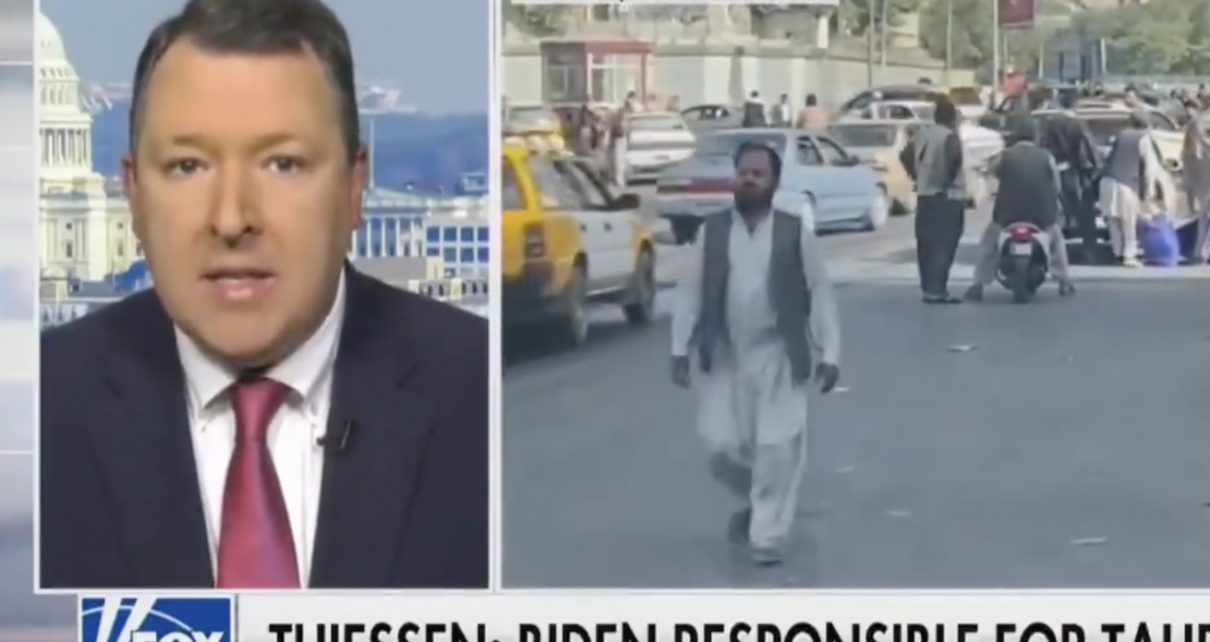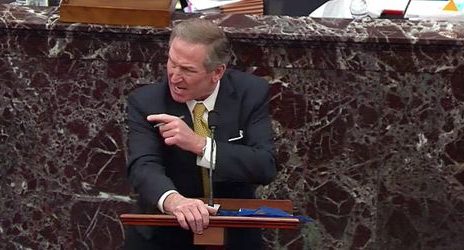
Cable news is dominated by the same Afghanistan hawks who created this mess.
Four presidential administrations share, in varying degrees, the blame for the Taliban’s sudden takeover of Afghanistan — a development that brought the United States’ 20-year war in the country to an ignominious conclusion.
But watch cable news and you’d think some of the retired officials who helped orchestrate and continue the war had learned nothing.
Fox News watchers particularly have been inundated with the message this week that it’s all President Joe Biden’s fault — a message coming from veterans of the George W. Bush administration. Take Fox News contributor and former Bush speechwriter Marc Thiessen, who told host Dana Perino during a segment on Monday that the idea of pulling US troops out was “shameful.”
“Khalid Sheikh Mohammed predicted this,” Thiessen continued, referring to the alleged architect of the 9/11 attacks. “He told his interrogator, after he was captured, he said, ‘You Americans, what you don’t understand is we don’t have to defeat you militarily. We only have to wait long enough for you to defeat yourselves by quitting.’ He predicted this day would come. And on the 20th anniversary of the attack that he carried out, it’s come true because of Joe Biden.”
“Sobering but also very true,” Perino, Bush’s former press secretary, replied.
Marc Thiessen, a former Bush speechwriter, tells Dana Perino, a former Bush press secretary, that he fully expects Biden to be “booed” when he speaks at Ground Zero next month and that “he really shouldn’t show his face” because of Afghanistan. pic.twitter.com/1IrzE6zNvN
— Justin Baragona (@justinbaragona) August 16, 2021
Nowhere in that segment did either person explicitly acknowledge they’d worked in the very administration that started the war, though a chyron did identify Thiessen as a “FMR GW BUSH SPEECHWRITER.”
But Fox News hasn’t been alone in giving people a platform to opine on US failures in Afghanistan who could benefit from some introspection. A similar dynamic played out on MSNBC on Sunday night, when guest anchor Anand Giridharadas gave host and former George W. Bush administration communications director Nicolle Wallace the opportunity to blame “long-hardwired historical reasons” for the ultimate failure of the US effort in Afghanistan.
On Tuesday, MSNBC host Andrea Mitchell interviewed former Obama administration CIA director and defense secretary Leon Panetta about Afghanistan. Panetta, who oversaw Obama’s failed surge of troops to Afghanistan, at least acknowledged that “there’s a lot of blame to go around,” but still tried to paint a relatively rosy picture of the past 20 years.
“What people fought for was worthwhile. We were able to achieve progress in Afghanistan,” said Panetta, who as recently as two months ago claimed that Afghan security forces and government had made “progress” and conducted “effective operations” — statements belied by the developments of the past two weeks.
CNN, meanwhile, gave retired Gen. David Petraeus a platform on Wednesday to criticize Biden’s handling of the situation, but didn’t mention that his tenure as commander of NATO forces in Afghanistan ended in the summer of 2011 with violence in the country escalating and with any prospects of a withdrawal frustrated.
Says the guy who killed multiple negotiations meant to end the war … while the Taliban was in a much, much weaker position. https://t.co/PgSCHf0n6M
— Noah Shachtman (@NoahShachtman) August 18, 2021
CNN also interviewed hawkish former Bush and Trump administration official John Bolton, who made a case that if the situation were “properly explained,” the American people would support the indefinite deployment of troops in Afghanistan, even though polling shows a plurality support withdrawal.
Print articles about the Taliban takeover of Afghanistan also privileged the voices of those with an interest in seeing US troops stay. As Judd Legum detailed for his Popular Information newsletter, a Washington Post piece written by Matt Viser and headlined “Biden’s promise to restore competence to the presidency is undercut by chaos in Afghanistan” quotes Panetta; Ryan Crocker, who served as ambassador to Afghanistan during the Bush and Obama administrations and in 2012 touted the Afghan security forces as an “amazing achievement”; Eliot Cohen, a self-described “hawk” who advised then-Secretary of State Condoleezza Rice during the Bush administration; and members of Congress who supported keeping troops in Afghanistan.
“Unrepresented in Viser’s piece are any voices that supported withdrawing U.S. forces from Afghanistan — even though a poll last month found that 73% of Americans supported withdrawal,” Legum writes, capturing a dynamic that’s been apparent across the media ecosystem.
While it’s true that 20 years of US troop presence in Afghanistan did prevent the country from becoming a haven for those planning attacks on the US homeland and did result in significant gains for Afghan women, the rapid collapse of the US-backed government suggests those gains weren’t sustainable without the indefinite presence of US troops in the country. But instead of acknowledging that perspective, the discussion of Afghanistan on cable news this week has been chock full of ex-officials looking to justify the minority view that troops should stay longer.
Fox News guests in particular have pointed the finger anywhere but themselves
To be clear, there are many legitimate criticisms of the Biden administration’s handling of Afghanistan. Even if one agrees with the president’s decision to follow through on the withdrawal deal struck last year by then-President Donald Trump and the Taliban, the US exit could have happened in a much more orderly fashion. And as my colleague Nicole Narea explained, the administration also could have done much more to evacuate Afghans who worked with US forces before the country descended into chaos.
Obama and his administration also aren’t blameless. Though Obama did fulfill the invasion’s initial objection by taking out al-Qaeda leader Osama bin Laden in neighboring Pakistan in 2011, his decision to escalate the US troop presence in Afghanistan in 2009 didn’t pay dividends, and his effort to implement a timeline for US withdrawal five years later didn’t work out, either.
But if anybody should think carefully about joining conservations about who is to blame for the current awful situation in Afghanistan, it should be alums of the George W. Bush and Donald Trump administrations.
Bush, of course, not only made the decision to invade Afghanistan in 2001 but failed to capture or take out bin Laden. And Trump struck a deal with the Taliban last year that put them in a position to rapidly take over the country as soon as US troops began to leave.
And that’s why Fox News’s decision to platform the likes of Thiessen and Perino during its Afghanistan discussions is egregious. Both worked in the Bush administration, as a speechwriter and press secretary, respectively. So they have self-interested reasons for playing the blame game, even while their own failures when it came to Afghanistan aren’t acknowledged.
Fox News has been by far the worst offender in this regard. Pundits brought on Fox this week to bash Biden for the Taliban takeover of Afghanistan also included Karl Rove, a top aide to George W. Bush; Mike Pompeo, who as secretary of state during the Trump administration oversaw the deal with the Taliban that put them in a position to quickly overrun Afghan forces as US troops withdraw; and Kayleigh McEnany, a former Trump press secretary.
What’s more, Thiessen, Perino, Pompeo, Rove, and McEnany are all currently paid by Fox News, with Perino and McEnany working as hosts and the other three joining various programs as paid contributors. Another contributor, Lara Trump, daughter-in-law to former President Trump, also went on Fox News on Monday to attack Biden.
Bringing out Trump’s daughter in law to explain that he bears no responsibility for what is happening in Afghanistan and it’s all Biden’s fault. pic.twitter.com/UkuuuHzQmA
— Matthew Gertz (@MattGertz) August 16, 2021
It’s true that the scenes of chaos in Afghanistan caused US support for withdrawal to drop precipitously, from 69 percent in April to 49 percent now, according to Morning Consult. But withdrawal is still more popular than opposing it, which Morning Consult says is the stance of 37 percent.
Yet prominent voices among the relatively small minority favoring keeping troops there are the ones being amplified by elite media. There’s a role for military and government sources to comment on situations like these. But the American failure in Afghanistan should lead to some rethinking about which voices dominate the conversation — and so far, that doesn’t seem to be happening.




